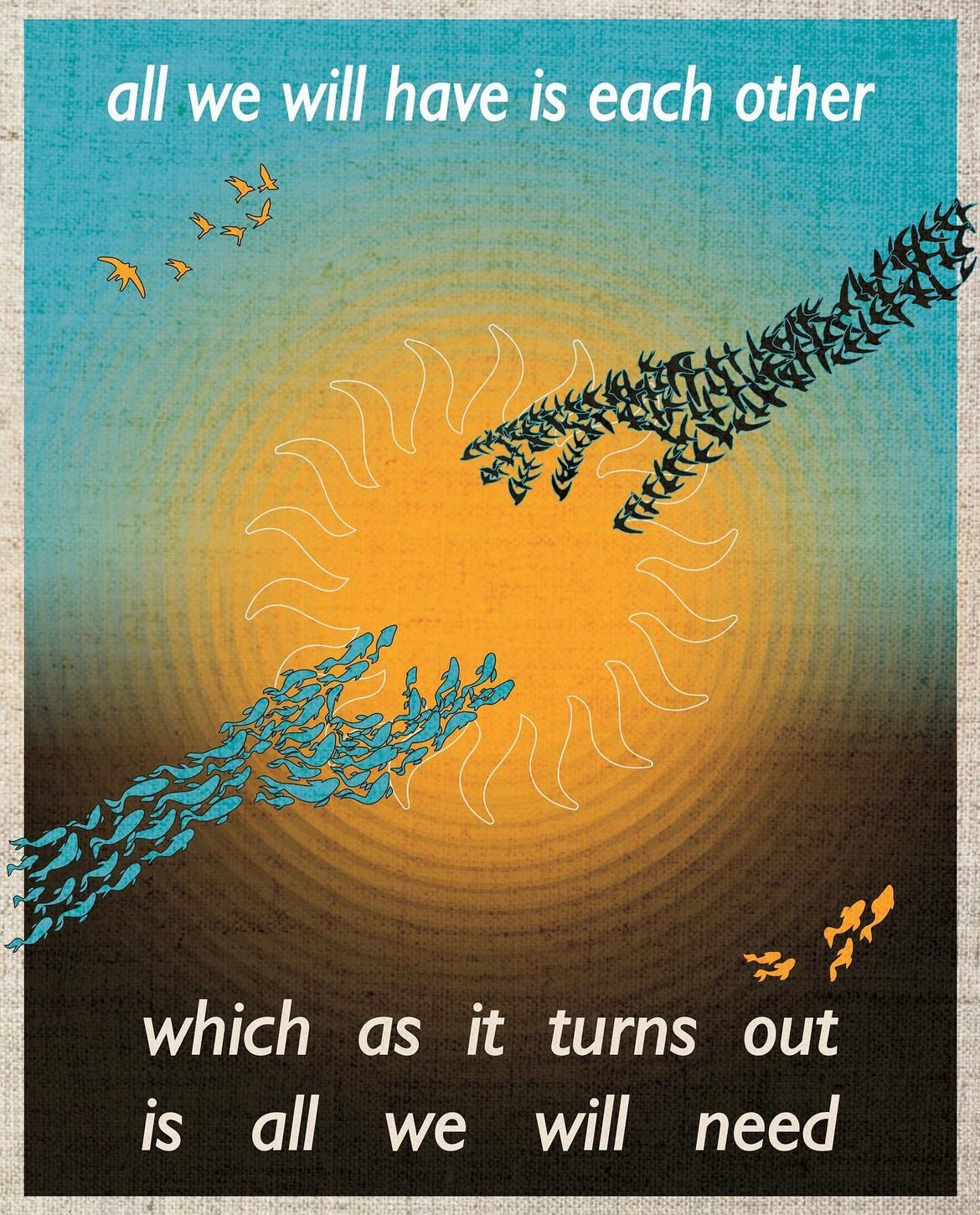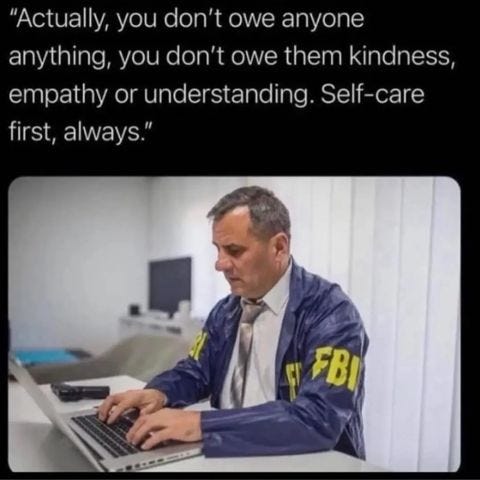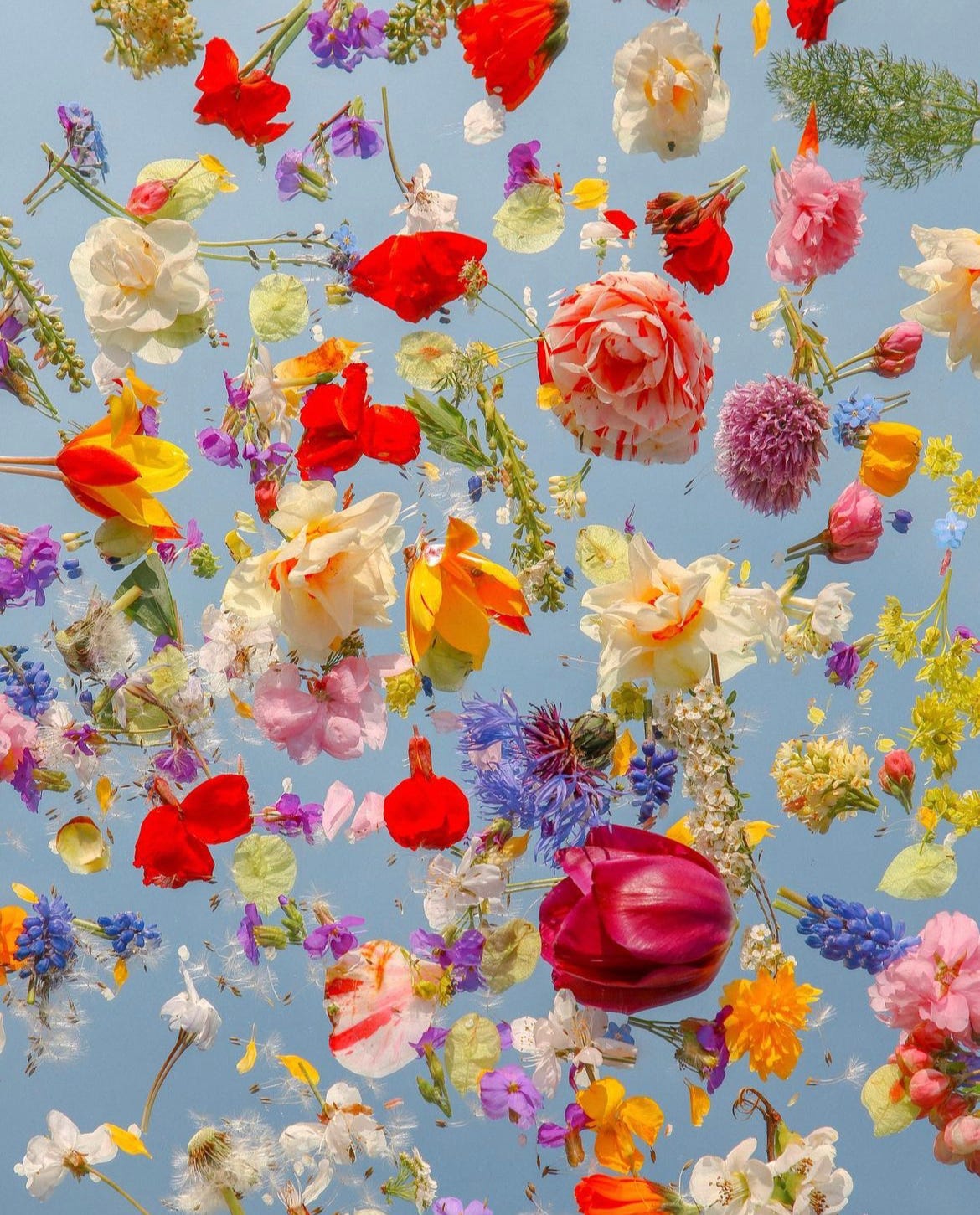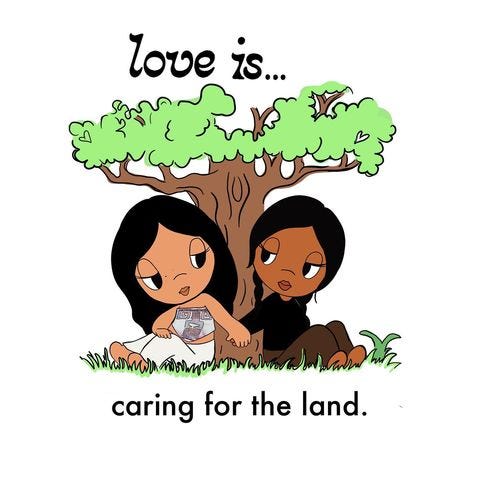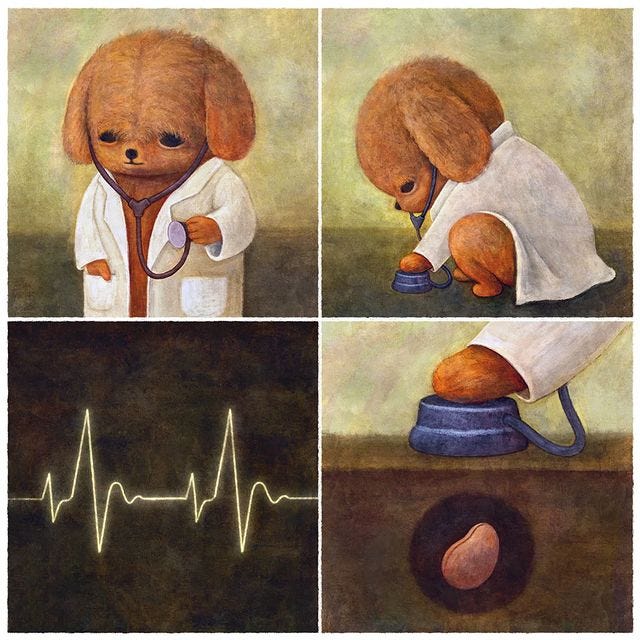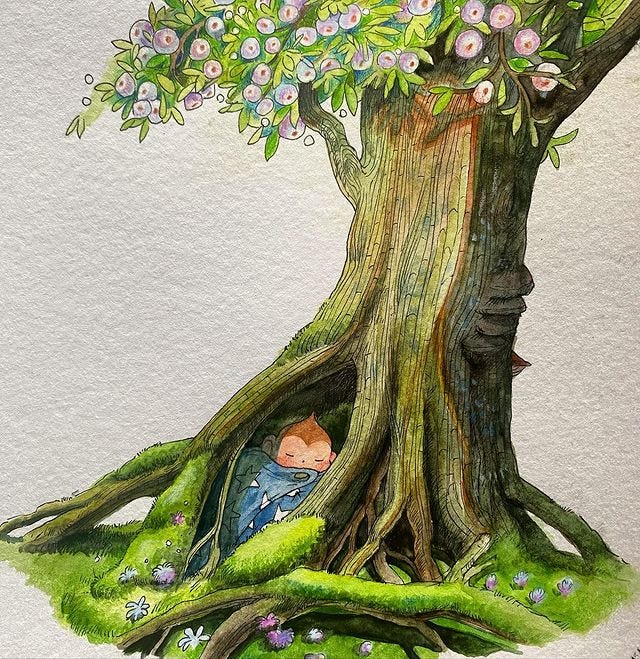It's time to embrace community care & let go of individualistic self-care
Care is a fundamentally relational, reciprocal practice & we were never meant to care for ourselves
Note: There may be some resistance & discomfort when I say “we need to dismantle self-care”. The concept is prominent in leftist spaces & hailed as a radical form resistance. However, it is rarely understood in its original context with the necessary caveats which I’ll elaborate on below. It has also been sanitized, manipulated & co-opted for profit. As a result, it’s become bigger than what it was intended to be. People look to self-care now as a revolutionary “solution” to our collective problems (which it is not). Given that we live under capitalist, colonial systems that breed individualism, narcissism & self-centeredness, I think it’s important for us to rethink the utility of this concept today. In this piece, bringing in the knowledge of collectivist, land-based cultures, I’ll explain why it is urgent & critical for us to practice + embody COMMUNITY care which is a more complete framework that creates conditions of liberation needed for us to survive & thrive as we fight for the land & against the ecological destruction of our planet.
So even if you feel some discomfort arise, take a deep breath & hear me out.
Self-care. Everyone loves self-care these days… including billionaires, wealthy celebrities, corporations, your workplace or academic institutions, pop culture, and every social media influencer & wellness “guru”. The flourishing multi-billion dollar wellness, self-help & self-care industry reflects on the popularity of the concept. Since I migrated to the United States, I’ve spent years trying to understand what the f*** “self-care” even means. The concept is entirely non-existent in many collectivist communities (particularly Indigenous or land-based communities in the Global South) and by extension it is incomprehensible to many of us. I’ve felt deficient, confused, & inadequate being unable to grasp something so many around me seemingly got (seemingly being the key word).
I kept asking “how can I care for myself when I cannot survive or thrive in a world by myself?” How can I care for myself when survival is a collective responsibility & we are fundamentally dependent on the care of so many beings? How can I care for myself in a vacuum when caring for others is inevitably how I end up being cared for? What does “self-care” mean when my wellbeing is inextricably tied to the health of my community, the land & every part of our ecosystems?
What does the concept of “self-care” actually mean, where did it come from & over time, what has been the collective impact of widespread normalization of “self-care” under capitalism?
The most prominent origins of the concept may be traced to Audre Lorde- a black, disabled, queer feminist who wrote about “self-care” during her battle against cancer in 1988 in A Burst of Light.
Sometimes I feel like I’m living on a different star from the one I am used to calling home. It has not been a steady progression. I had to examine, in my dreams as well as in my immune-function tests, the devastating effects of overextension. Overextending myself is not stretching myself. I had to accept how difficult it is to monitor the difference. Necessary for me as cutting down on sugar. Crucial. Physically. Psychically. Caring for myself is not a self-indulgence, it is self-preservation, and that is an act of political warfare.
She wrote about how cancer pushed her to realize that we all needed to slow down, pull back from oppressive systems, refuse to operate according to their values or accelerated “productivity” benchmarks when we can & that this divestment from a profit-driven system was critical for us to even begin to think about what collective “health” & healing means. It is an important first step in one’s political radicalization journey. It’s not everything & it wasn’t meant to be.
Self-care today is often reduced to: i) consumption of products, ii) neglect of community & erasure of the contributions of other beings who enable our care, and iii) one-sided, transactional extraction of care with a sense of entitlement to receive care without reciprocity or without focusing on daily practices of giving care in community. What does self-care look like in practice today?
Sometimes, it looks like people pulling back from the hustle & grind to slow down & prioritize rest which is critical. But, then what? Thinking of ourselves as individuals in an already individualistic society is innately more limiting than it is helpful. When we embrace that we are inter-dependent beings just like any other life form— a whole world of care opens up to us even if it may take practice to seek it out & ease into it. I think pulling back from the system can catalyze the self-awareness we need to reach out for connection & build reciprocal relationships but “self-care” is not the endpoint or goal by any means. Fixating on it beyond the initial act to divest from capitalist/ colonial systems can lead to stagnancy & prevent growth. We need a lot more than the absence of work to survive & that missing piece is community.
On the other hand, what does “self-care” that actively harms the collective look like? Relax at home alone with a sheet mask while ignoring a friend who reached out to connect because “you don’t owe anyone anything”, purchase care products & services from violent corporations killing our planet as a form of “self-love” while deprioritizing community building thinking it will heal you, take a luxury vacation in an impoverished community in the global south, deprioritize friendships to focus on doing “the work” or a self-centered pursuit of success, mindfulness/ meditation/ bikram yoga/ kundalini/ chakra/ other cultural thefts or tarot reading to manifest wealth, neglect the needs of others or frame any form of community accountability or folks calling you in as an insult to “self-worth”, girl bosses who treat themselves to fancy fine-dining restaurants & get massages from under-paid, over-worked pink collar workers so they can be in the optimal state of mind to exploit others & dominate their peers… you get the point. Ultimately, the “self” in self-care further enables the colonial, capitalist fallacy that we can & should look out for ourselves when care is only something we can give each other.
Mainstream self-care has created NEW forms of oppression, extraction & exploitation. Granted working class folks are forced to partake in many unethical consumption practices because it’s all we can sometimes afford— but it is one thing to know that and another to overly rely on individualistic consumption framing it is the holy grail of “care”. Today, many people partake in self-care as a means to enable their personal success & wealth accumulation under capitalism which is how we’ve come to turning to rich celebrities for “care advice”.
Capitalism only wants care to be a commodity that can be consumed for profit & it is only an acceptable activity in so far as it enables further productivity. In reality, care is a fundamental contradiction to capitalism— a system that does not care at all. Even movement spaces that superficially boost self-care rhetoric continue to deprioritize or dismiss the necessity & value of relationships, intimacy & collective care. As I wrote about in this piece- at best, care is seen as something to engage in to maximize movement productivity, fast growth & other covertly latent capitalist metrics of “progress”:
Capitalism tells us that we can consume our way to freedom so it is understandable that often our instincts when we want to alleviate our pain or distress are “what product can I buy that will make me feel better?” However, when we don’t question the individualistic values drilled into us, we focus more on receiving care by consuming care or being entitled to it. This is only possible because colonialism objectifies everything— including other beings (human or otherwise) and the whole planet, which is framed as an object that can be exponentially extracted from for selfish purposes and it is this flawed logic that we often approach care through.
Keep in mind that majority of political theory, literature, writings or art you may have been exposed to comes from the so called “west”. Besides select revolutionaries from the global south (or many times NOT revolutionaries but oppressors who are hailed as heroes by authoritarian state-supporters), majority of leftist literature & art is from the United States, Europe, Canada & other settler, colonial states (even if some of it is from folks of color). Colonialism shapes these global power dynamics that crush alternative ways of thinking & being that are rooted in collectivist community traditions. For example, English- a colonial language spread globally & brutally enforced, being the main medium severely limits the collectivist, decolonized perspectives you may have been exposed to. “Leftist” spaces sometimes lack non-western cultural context or land-based knowledge.
To give some examples of how this emphasis on western ideals has impacted me— I did not understand the hyper-reliance on individual identities as the “ultimate” tools of liberation & early on saw their limitations. Given that race, sex, sexuality, gender, psychiatric diagnostic categories are all colonial social constructs, neocolonialism on a personal level has looked like me forcing myself to fit these boxes while pushing myself to unlearn my communities ways of existing beyond them which I am only now slowly decolonizing & getting back to. Similarly, self-love & self-care have all felt like fragmented, at best incomplete & most often, insidious, self-centered, egotistical concepts that enable abandonment of community or erase the critical contributions of the land, other people & beings in facilitating our survival. In liberal “self-care”, mental health spaces that are strife with individualism, I’ve tried to understand, learn, listen & humbly accepted that maybe I don’t know what I’m talking about. But eventually in many cases, I’ve realized I was being colonized more covertly. Today, people struggle to imagine what medicine or healthcare in general would look like beyond colonial frameworks like individualized therapy or psychiatric diagnoses.
The perspectives I offer in my community care work are not MY novel findings but a responsibility I bear as part of my ancestral/ community teachings & traditions. These perspectives are sorely missing in leftist spaces. I write this piece to honor our collectivist traditions & to affirm the many global communities who find the concept of “self-care” reductive, confusing or fundamentally indecipherable. Our cultures are rooted in caring for each other & the land that sustains us all— I’m slowly learning to carry & embody these values by any means necessary.
ALL care is community care.
Practice: Think of something you categorize as “self-care”. What are all of the factors & pieces that enable that action that extend beyond you as an individual? I firmly believe that there is no complete act of care that is solely created or enabled by the “self”. It might take a minute to think about all the sociopolitical, environmental factors that enabled that act of care beyond the precise moment that you received said care. It might take some conscious de-centering of the self to center community that already sustains us in ways we may not realize. Are there actions or activities you perform in your daily life that you have come to realize are a form of community care? Are there ways you’ve been more intentional about engaging in caregiving & caretaking which has also allowed you to feel cared for?
Capitalism/ colonialism manipulate & brainwash us to only categorize certain things as “care” to keep us from realizing what we truly need for liberation— connection to the collective (other humans, the land, every part of our ecosystems). Capitalism deludes us into thinking we can care for ourselves which is impossible. It also actively prevents us from caring for each other & only leaves us with care “products” that apparently appear out of nowhere. It physically, emotionally & spiritually pains me to see the contributions of the land & other caregiving people entirely erased. This is why many of our collectivist communities reject the idea of “self-care”, not only because the “self” is nothing in a vacuum without the collective but because further emboldening of individualistic self-care practices will only perpetuate ecological destruction. It’s time we care for each other & the land by any means necessary.
Did you breathe today? That was care you received from plants who generously sustain so many living beings. Did you eat today? That was care you received from other living beings. The microbes in your gut that call you home helped you digest that food & process the most critical nutrients you need to survive. It is an injustice to dismiss the contributions of other beings who intentionally pour in their love, time & energy into keeping us alive. Such simple day-to-day basic acts of community care are often overlooked.
Did you sleep today? That creation of that bed or sleeping bag or blanket involved the labor of so many beings— human & otherwise. If you have the privilege of shelter (which should be a basic right) then that roof over your head was also built by many people. If you put on clothes today, those were made by someone. Did you drink coffee or tea today? That was picked, prepared & concocted by someone & the base ingredients are plants.
Is there anything you do that doesn’t directly or indirectly involve the contribution of other beings? Even when we rest, there are conditions of some level of safety or security that have to be enabled for us to truly rest. So let’s take a moment to sit with how the beings at the other end of the “care products” we consume are being treated.
Capitalism doesn’t want you to know about the violence & brutality that lies at the other end of the production line- the misery & suffering of the person who made your outfit in a sweatshop, the deforestation/ destruction of local communities & theft of indigenous land so imperial armies could bring you care products or the ecosystems that are being decimated to bring you “organic”, “ethically sourced”, “cruelty free” vegan products. It is critical for us to step back & see the problem for what it is beyond the “self”. In reality, care is more meaningful when it IS RECIPROCAL as in you know exactly who is on the other end of it and you’re putting in time & energy to sustain THEM as well. Capitalism has tried to sever us from the things we need to truly feel cared for— community & connection to land. These bonds cannot be broken so we might as well actively pursue, forge & cultivate them.
Did you drink water today? The LAND gave you that. Did you feel sunlight grace your body (which inadvertently sustained you)? The sun is our home star that is directly responsible for all life processes on Earth— from the food we eat to the weather, the sun creates necessary conditions for life. I emphasize the contributions of the land because capitalism frames the ground beneath us & the sky above us as inanimate, lifeless, worthless objects that can be harnessed, extracted & exploited for selfish gains. This is the core ideology that drives environmental crises & the destruction of our planet. This isn’t a “future threat”- the harm is ongoing. Communities are being harmed right now & to pushback we have to start seeing ourselves as part of the land & not separate from it. Even if you don’t have a direct connection to land or a land-based communal context, sustainable care requires you to think about how you can give care (to land & community) as part of receiving care. When we realize that we NEED connection to land to survive, the pursuit of that connection itself is liberating & freeing.
Did you cook a meal with or for someone? That was an act of community care. Can you do more of that? Did you cook a family recipe? That was ancestors caring for you across time/ space. Culture is intergenerational community care. When we engage in cultural, religious/ spiritual, traditional, creative, artistic rituals we’re receiving & simultaneously giving care in complex, beautiful, uplifting, regenerative ways. Did you listen to a song or read something today that resonated with you (maybe or maybe not this newsletter lol)? Then that was an artist’s community care offering. Capitalism commodifies everything & care can get messy in this context. But knowing community care is the world we’re building pushes us to think beyond consumerism which ultimately saved my life.
Have you been there for a friend or vice versa? Have you intentionally co-created connection that has allowed you to cook with, laugh with & cry with other people? Then you’ve engaged in community care. Maybe some of you are trying to grow food, learn more about your local ecosystems, volunteer at community gardens, or pay attention to your local ecology as you go about your day— care, care, it’s all community care. What would we be doing if capitalism didn’t exist? More of that. Everyday. We will be free when we know exactly who makes each thing that sustains us & we engage in giving care including taking care of the land.
It is individualism & the colonizer in our head that may lead us to falsely think that we can be “independent”, self-sufficient or self-reliant. We are wholly inter-dependent so we might as well honor that & pursue it intentionally in our day-to-day life.
Thinking of yourself as part of a collective is more helpful- an ecological, sustainable care model
It may also help to think of yourself as an ecosystem like a forest or a plant rooted in soil (because you are but given norms that have socialized you to see yourself as separate nature, this has to be an intentional act). It can be more helpful than thinking of yourself as an “individual”.
Close your eyes, imagine yourself not as a human existing in a vacuum but as another entity like a plant enmeshed in an intricate resource-sharing root network or a serene prairie, a coral reef, a river stream, a pond in a forest… what would you need to exist & thrive? What do we any of us need for our lives to be sustainable? If you were solely being extracted from & depleted without being nourished, supported & cared for— you would not be able to survive sustainably. This is the climate crisis— the planet is being extracted from at an exponential rate for profit (capitalism is about putting the least amount of care in to get the highest yield) & this is killing it, it’s killing us.
If a plant is constantly picked from without being rooted in fertile soil, watered, nourished with minerals, receiving nutrients from root microbes, etc… it will not be able to go on for long. & to receive care, plants fundamentally engage in giving— photosynthesizing, processing nutrients & disseminating them through root networks… these are all forms of care they give so they can also eventually RECEIVE. It is not a transactional process. It is reciprocal. You are not any different from an ecosystem, a plant or the planet itself. The more time you spend doing things that are regenerative (like caregiving, caretaking, care receiving in community), the more sustainable your life is. Community care isn’t a means to an end, it is why we are alive. It gives us meaning & purpose just like it gives plants or microbes or the soil meaning.
Paid subscribers: Next newsletter will be a video where I’ll talk thru some reflections & lessons on community care from my recent journey back to my coastal village in South India. I archived as much as I could while balancing the need to be wholly present with my community because each moment was precious so I’ll include pictures so you can get an idea of what it actually looks like (there’s only so many things I can relay thru words). I’ll also include care practices or rituals I’m working on integrating into my daily life/ relationships here in Nashville based on our collectivist traditions.
In conclusion: Care is fundamentally relational
There are countless forces & parts of our ecosystem outside of our so called “individual” bodies that are inevitably necessary in any form of care. Erasing, neglecting, dismissing or even subconsciously overlooking these contributions doesn’t actually provide us with the full community care we need to survive more sustainably.
For folks raised in western societies who have been systematically separated from community, land & stripped of culture (or culture has been desecrated by colonialism)— it may be difficult to even imagine what community care looks like. For some of us, it may be more intuitive because of course we must care for the land that cares for us. This is the fundamental foundation of our collectivist communities which shapes every aspect of our cultural traditions (& we have been subject to state violence for our traditions). So what does “decolonizing” looks like in practice especially for folks who have less cultural connection?
Keep reading with a 7-day free trial
Subscribe to Cosmic Anarchy to keep reading this post and get 7 days of free access to the full post archives.




